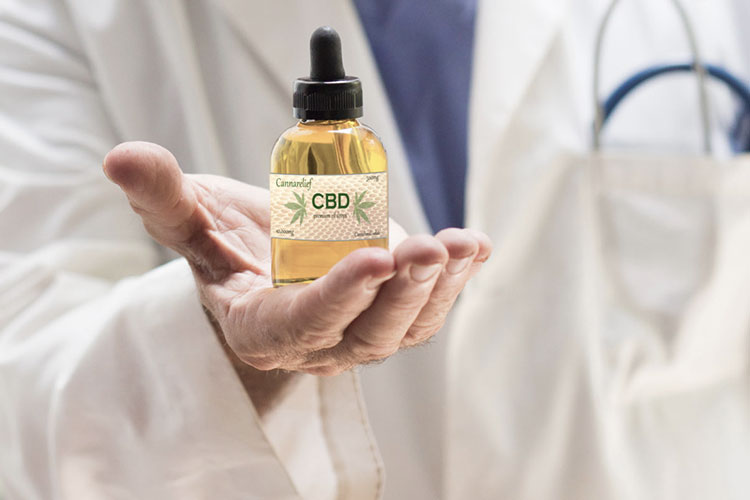Of people who use CBD, 22% claim they use it in place of over-the-counter and prescription medication. Among American CBD users, 42% use it for insomnia, while 49% use it for anxiety and 64% for pain relief.
Aside from the above uses, cannabidiol (CBD) also helps:
- Lower appetite
- Reduce stress
- Induce sleep
- Control inflammation
- Overcome nausea
Do doctors recommend CBD oil? Even though it is not yet FDA-approved, more doctors recommend CBD as a natural alternative for treating and managing various ailments. That’s because multiple studies and anecdotal evidence suggest that CBD is safer and more effective than certain prescription medications.
Can my doctor prescribe CBD oil?
The Food and Drug Administration (FDA) is currently working to verify the safety of CBD products. For now, Epidiolex, a prescription drug for treating childhood epilepsy and certain seizures, is one of the few FDA-approved CBD medications.
Until CBD becomes fully FDA-approved, doctors cannot prescribe any other CBD product as medication. They can only recommend or suggest using a CBD product that is legal in the state they operate.
Now let’s look into why and how you should consult your doctor before treating an ailment with CBD.
Talking to Your Doctor About CBD
Before deciding to experiment with CBD to treat a medical condition, you should talk to your doctor first. Here’s what to know before consulting your doctor about CBD.
The Legality of CBD in Your State
Federal law permits the use of CBD products derived from the hemp plant, which contains less than 0.3% Tetrahydrocannabinol (THC). Some states, such as California, permit the use of CBD products that include more than 0.3% THC. Other states, like Nebraska and Idaho, only allow CBD concentrates that contain 0% THC.
Before buying any CBD product, verify your local cannabis laws to avoid legal trouble.
Go to Your Doctor’s Appointment Prepared
Before seeing your doctor, research your symptoms and how CBD can help alleviate them. Your research will enable you to ask your doctor relevant questions and receive useful answers about using CBD.
Since most doctors don’t learn about CBD and the endocannabinoid system in medical school, your doctor might not have the answers you need. If that happens, don’t hesitate to get a second opinion from a more knowledgeable doctor.
To get the best information possible, contact a doctor who has experience with medical cannabis. These doctors participate in cannabis studies and are well-informed about the latest developments in the field. You can find such a medical professional in your location by performing a simple Google search.
When do Doctors Recommend CBD Oil?
According to the US Court of Appeals ruling in the case of Conant v. Walters, a doctor can legally recommend cannabis for treating chronic and debilitating medical conditions. What counts as a debilitating illness varies by state, but here are some medical conditions that doctors typically recommend CBD for:
Depression
Symptoms of depression include overwhelming feelings of sadness and losing interest in previously enjoyable activities. The condition is treatable, and scientists at Washington State University believe cannabis can reduce depression and anxiety symptoms.
Rheumatoid Arthritis (RA)
RA is an autoimmune disease that leads to inflammation of the joints. Inflammation occurs as the immune system attacks the tissue lining the joints, causing swelling and intense pain. Instead of over-the-counter drugs or surgery, you can take advantage of CBD’s anti-inflammatory properties to reduce joint swelling and pain. You can take CBD for arthritis either orally or topically.
Fibromyalgia
Fibromyalgia’s primary symptom is intense pain felt all over the body. The pain can lead to trouble concentrating and fatigue. According to the Journal of Clinical Rheumatology, CBD can help reduce the pain caused by fibromyalgia.
Multiple Sclerosis
Multiple sclerosis (MS) is the body’s immune system harming the central nervous system. The attack damages the fatty substance (myelin) surrounding the nervous system, causing brain, eye, and spinal cord complications.
MS currently does not have a cure, but research by the American Academy of Neurology indicates that CBD can reduce pain, spasticity, and urinary frequency.
HIV/AIDS
HIV is an infection that destroys the immune system as it transforms into full-blown AIDS. HIV and AIDS patients experience severe weight loss, nausea, vomiting, and chronic pain. Dronabinol is FDA-approved synthetic cannabis that doctors recommend for treating decreased appetite and weight loss caused by HIV or AIDS. Medical marijuana or full-spectrum CBD can also help with pain relief.
Cancer
Chemotherapy is a popular cancer treatment, but it has severe side effects, such as fatigue, appetite loss, nausea, and chronic pain. Synthetic and natural cannabis can help alleviate chemotherapy symptoms, including pain caused by nerve damage.
Parkinson’s Disease
Parkinson’s disease damages the nervous system and causes tremors and limb stiffness. The condition has no cure, but CBD can alleviate tremors by targeting and regulating the receptors that control muscle movement.
Crohn’s Disease
Crohn’s disease causes digestive tract inflammation. Its devastating symptoms include intense abdominal pain and delayed physical growth. Studies by the Crohn’s and Colitis Foundation indicate that using cannabis can reduce intestinal inflammation and improve sleep.
Post-Traumatic Stress Disorder (PTSD)
PTSD is a psychiatric disorder triggered by experiencing or witnessing a traumatic event. PTSD patients typically experience depression, anxiety, insomnia, and uncontrollable anger. Studies indicate that using CBD can help reduce nightmares and manage anxiety and depression.
Glaucoma
Glaucoma develops as fluid builds up in the eye and damages the optic nerve. It can lead to blurred vision, severe eye pain, and nausea or vomiting. Research by the British Journal of Ophthalmology indicates that cannabis can reduce the pain and discomfort associated with glaucoma.
Epilepsy
Epilepsy is a condition that causes recurring seizures. Using CBD, including the FDA-approved Epidolex, as an oral seizure treatment has yielded promising results. Note that CBD products work best for seizures when they contain little to no THC.
Alzheimer’s Disease and Dementia
Alzheimer’s is a type of dementia that occurs as brain neurons die. As many as 13 states in the US permit doctors to recommend cannabis as an Alzheimer’s treatment. However, note that using CBD does not stop or reverse Alzheimer’s or dementia. It only helps with managing the symptoms, such as aggression, anxiety, and agitation.
Tourette’s Syndrome
Since it’s a neurological disorder, Tourette disrupts a person’s motor or phonic abilities, leading to irrepressible and repetitive movements or sounds. CBD products can help soothe patients and reduce their physical tics.
Instances Your Doctor May Not Recommend CBD
High-quality CBD is generally safe to use, and hardly any consumer has reported short- or long-term side effects. However, using CBD in certain situations can be medically unsafe, such as when pregnant, breastfeeding, or using medications that don’t pair well with CBD.
Examples of drugs that you must not take with CBD are:
- Fluoxetine, Prozac, or similar anti-depressants
- Anti-psychotics or benzodiazepines that cause drowsiness
- Macrolide antibiotics
- Heart rhythm medications
- Thyroid medication
If you take these drugs with CBD, the following may occur:
- Antagonistic interactions: CBD reduces the potency of your medication.
- Agonistic interactions: CBD amplifies the effects of your medication to possibly harmful levels.
- CYP450 liver metabolism: If your medication shares many of the same enzymes as CBD, your liver will struggle to break it down. Reduced liver performance causes a buildup of enzymes in the bloodstream, which can be dangerous.
Doctors that Recommend CBD Oil
Various health care professionals recommend CBD for different purposes. Some of these medical practitioners include:
Internists
An internist specializes in internal medicine. Since using CBD maintains homeostasis, which is essential for a well-balanced and healthy body, internists recommend using CBD to ensure overall wellness. Some internists also recommend CBD as an alternative for treating fibromyalgia and pain without getting high or developing a drug dependency.
Psychologists
Unlike most anti-depressants, anti-psychotics, and anti-anxiety medication, CBD is non-addictive. The lack of severe side effects has made CBD popular among psychologists for helping patients relax, manage mood, and improve sleep. Some psychologists also recommend CBD to patients who are trying to overcome substance dependence.
Dermatologists
Since CBD has anti-inflammatory and antioxidant properties, some dermatologists use CBD-infused topicals to treat skin inflammations. Besides reducing skin irritation and redness, studies show that topical CBD products can treat acne, soothe psoriasis, and slow aging.
Chiropractors
Chiropractors diagnose and treat neuromuscular disorders. If a patient suffers from chronic inflammation, a chiropractor can recommend CBD in place of prescription medication. CBD can also provide pain relief to patients post chiropractic adjustment and help with sleeplessness.
Nutritionists
Since CBD contains various brain-boosting antioxidants, nutritionists recommend incorporating CBD into your diet to support brain health. CBD oil also contains several essential amino acids, magnesium, omega-3 and -6 fatty acids, and other nutrients that promote overall health.
Getting CBD for Medical Purposes
The quality of CBD products varies between manufacturers. To get a safe and superior product that can help you achieve your health goals, only buy products from reputable and highly rated brands. At LearningCBD, we only offer products from top CBD brands. Please browse our store to view our current stock and check out our educational posts for more on how CBD can improve your quality of life.
FAQs About Do Doctors Recommend CBD Oil
Question: Do doctors recommend CBD oil for anxiety?
Answer: CBD oil derived from the hemp plant can help with anxiety without getting you high. Depending on your symptoms, your doctor may recommend CBD alongside psychotherapy to manage your anxiety triggers and symptoms.
Question: What do doctors say about CBD oil?
Answer: In 2018, the World Health Organization (WHO) declared CBD oil a safe product that causes no harm to humans or animals. Many doctors agree about the physical and mental health benefits of using CBD, but others are skeptical about using CBD without FDA approval.
If your doctor is unenthusiastic about recommending CBD oil to treat an ailment, seek a more CBD-friendly doctor’s opinion.
Question: Does CBD oil actually do anything?
Answer: Most of the evidence supporting CBD oil’s benefits are anecdotal but convincing enough for doctors to recommend it as a(n):
- Mild sedative
- Anti-nausea
- Anti-inflammatory
- Mild appetite suppressant
- Stress reliever
- Anti-depressant
- Adaptogenic
Since CBD oil affects everyone differently, the best way to determine its effectiveness is to try it yourself. Before you start using CBD, identify what you would like to achieve by using it and monitor your body for changes over the period you consume CBD.
Question: What drugs shouldn’t you take with CBD?
Answer: Some drugs interact poorly with CBD, such as:
- Fluoxetine, Prozac, or similar anti-depressants
- Anti-psychotics or benzodiazepines that cause drowsiness
- Seizure medication, such as clobazam, lamotrigine, and valproate
- Blood thinners like warfarin
- Macrolide antibiotics
- Heart rhythm medications
- Thyroid medication
Before using CBD, consult your doctor to verify the safety of using the product alongside your current medication.
Question: Who needs CBD?
Answer: Anyone can benefit from using CBD. Even if you are 100% healthy, incorporating CBD into your lifestyle will help maintain homeostasis – optimal internal, physical, and chemical conditions throughout your body.
Question: Can CBD oil hurt your liver?
Answer: CBD is safe to use as long as you are using a high-quality product in the proper dosage.










